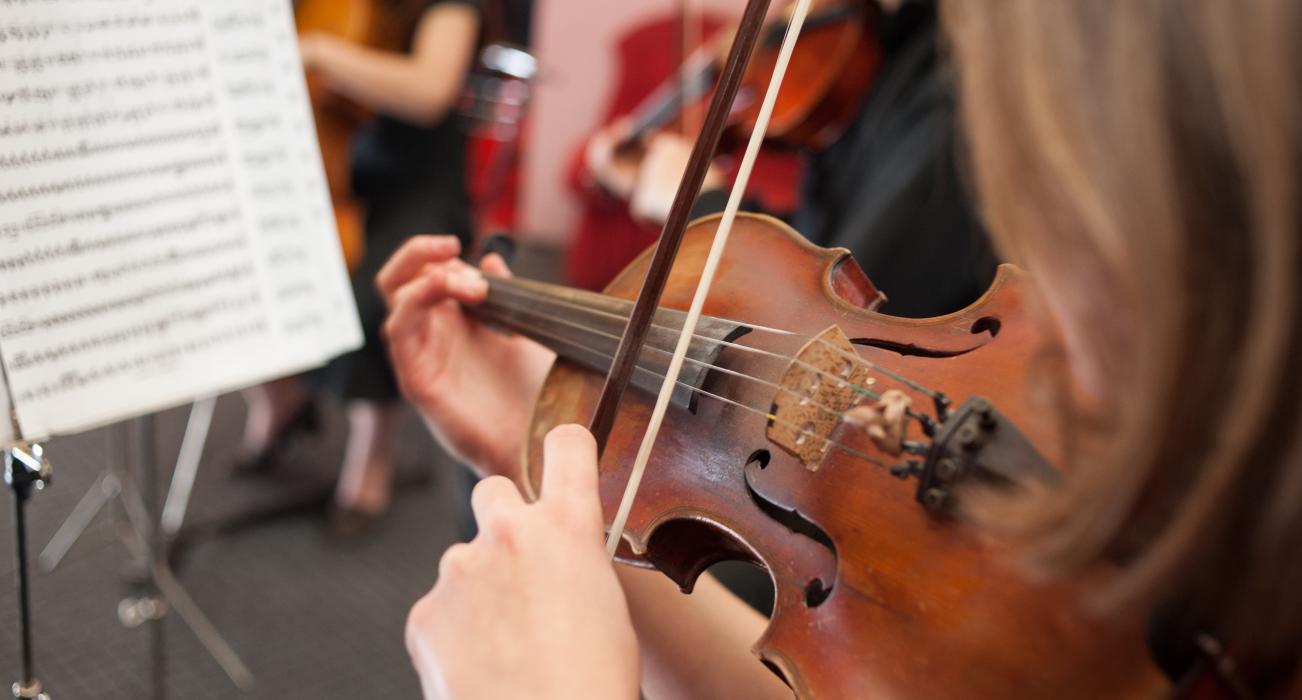Music
Fact File
Our undergraduate programme gives you an exceptionally solid foundation in the Western classical tradition, but you will also find courses in jazz, popular music and world music.
The first year provides a broadly-based introduction to the subject, while the second and third years offer increasing opportunities for specialism, including substantial self-directed projects such as dissertations and composition portfolios.
Music at Cambridge covers a broad range of music and variety of ways of thinking about and understanding music. While performance is an option in all three years, the focus of the tripos is on the rigorous study of history, analysis and composition.
The Music Tripos, leading to the Bachelor of Arts degree after three years, is examined at the end of each year. The first year (Part IA) consists of compulsory papers in three major areas, and two half-papers chosen from a range of options. These papers provide a secure and interconnected foundation for further study. Part IB, taken during the second year, offers some opportunity to specialise, alongside taking a further paper in each of the core areas (historical studies, analysis and tonal skills). Subject to Faculty approval, students can replace one of these papers with an optional paper.
During the final year, Part II, a greater number of options allow students to shape their learning more individually. There are no compulsory papers – students choose six papers from a wide selection of options which reflect their own interests and which may also develop the skills and knowledge needed for their chosen career path. Recent options in Part II papers can be found at the Faculty of Music's website.
One of the smaller and more intimate colleges, Magdalene is an active musical community. In addition to the students we admit to study Music as an academic discipline, a large number of students engaged in other courses are actively involved in the college's musical life.
The College has a number of dedicated funds to reward and encourage excellence in both academic and practical music. Lincoln Prizes, with a value of £150 each, are for those who achieve a First Class in any year of the Music Tripos. These Prizes are in addition to College or Bundy Scholarships.
Discretionary Lincoln Grants are available for those requiring financial assistance with the cost of music lessons, music books, etc. These are administered in line with the procedure for Financial Aid Applications via the Tutors.
Lincoln Awards of £400 or £200 each are awarded annually to current students (instrumentalists, vocalists, groups and composers, both undergraduates and postgraduates) who are invited to audition in the Lent Term. Audition criteria are of a standard equivalent to that required to pass grade VIII with distinction. Further information may be found on the Lincoln Award webpage
Lincoln Award holders are expected to contribute to the promotion of College music, and renewal is subject to a formal appraisal at the end of each academic year.
Organ and Choral Scholarships and Instrumental Awards
The College offers Organ and Choral scholarships each year and there are opportunities for musicians of every standard and type at Magdalene; to foster excellence, awards are available to instrumental players through the inter-collegiate Instrumental Awards Scheme run by a committee of music lecturers.
For more about the musical life in the College and information about how to apply for music scholarships and instrumental awards, please follow the links on the right or contact the Director of College Music.
Applicants in Music must be curious – preferably enthusiastic – about their subject, with a desire to do more than simply play or listen to music. A large part of the course is devoted to theoretical and historical elements, so students must be motivated to engage with the music on an analytical level as well as with a wide variety of secondary literature. There are many opportunities to perform in Cambridge and at Magdalene, although many of these are extra-curricular in nature, as performance is not an obligatory part of the Music course. Having said that, we do normally expect some sort of proficiency in at least one instrument. Other useful skills include having a foreign language, and a broader interest in something like history, culture, anthropology, or even science may also be beneficial.
Magdalene typically takes one or two students in Music each year. We welcome applications from those who have studied at any sort of school, from any country, and we welcome enquiries from prospective candidates at any point in the year.
Applicants are usually required to be taking (or have achieved) an A-level in Music from a board whose syllabus focuses on the academic study of the subject. ABRSM Grade 8 Theory may be an acceptable alternative to A-level Music, though applicants are advised to contact the Academic Office before applying to discuss the possible implications of this alternative to A-level Music.
The minimum offer level is A*AA at A-level (or equivalent), or 41-42 on the IB with 7,7,6 at Higher Level.
Interviews, Music Tests, and Written Work
Candidates invited for interview will normally have two interviews: a subject interview with the Director of Studies in Music and another member of the Music Faculty, and a more general academic interview with two other Fellows of the College (one of whom may be a musician). Each interview will usually last about 20-25 minutes.
At the time of their interviews, candidates will be asked to take a short test in some musical skills, including some simple harmony exercises, and will be given an unseen piece of music and musical text to analyse.
Applicants are also asked to submit in advance one recent essay and one piece of harmony or composition work.

